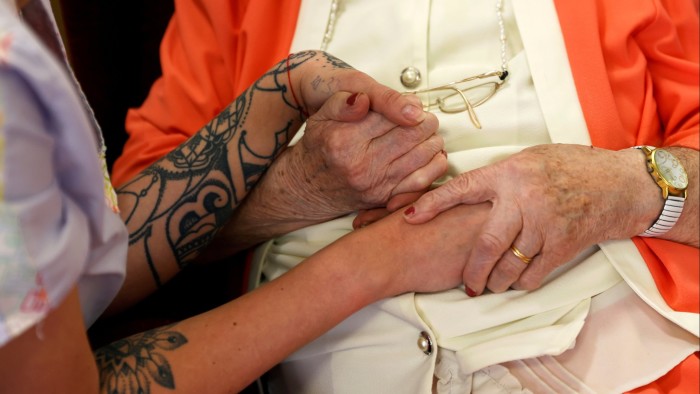caution and compromise may end in dissatisfaction

This article is an on-site version of our Inside Politics newsletter. Subscribers can sign up here to get the newsletter delivered every weekday. If you’re not a subscriber, you can still receive the newsletter free for 30 days
Good morning. Will one of the policy legacies of this parliament be passing assisted dying into law? The honest answer is “I don’t know”.
Although assisted dying has been heavily defeated in the past, the huge influx of new MPs on all sides of the House means it is very hard to work out what the mood is. From my gradual “getting to know you” conversations with new MPs, my impression is that the vote this month will be close, but I would be surprised if that sense turns out to be at all representative at this stage: many MPs are still making their minds up. Indeed, one of those undecided is Keir Starmer.
However, I do have some thoughts on the process that has led to the vote later this month. More on that below.
Inside Politics is edited by Georgina Quach. Read the previous edition of the newsletter here. Please send gossip, thoughts and feedback to [email protected]
Cause for concern
Harold Wilson’s first Labour government passed a number of liberalising reforms, on the death penalty, divorce law, reproductive rights and decriminalising homosexuality via private members’ bills and free votes (where MPs are not obliged to vote on party lines). Similarly, votes on legislation banning smoking in enclosed spaces and a swath of LGBT rights were passed by free votes under New Labour and the last Conservative government. (Slightly more incongruously, the Thatcher government made seatbelts mandatory via a conscience vote.)
So in some ways, you can see the Labour government’s thinking in deciding not to bring forward its own legislation for the latest vote on assisted dying. Previous bills on the issue have been brought forward by backbenchers in the Lords and the Commons. The Labour party is split at the highest levels on the issue: health secretary, Wes Streeting, and justice secretary, Shabana Mahmood, both oppose a change in the law. (Streeting, who backed changing the law last time, dealt a particularly heavy blow to the measure by saying he had changed his mind owing to the country’s palliative care not being good enough for patients to make an informed choice.)
But by not taking ownership of the bill’s drafting, I think the government has erred, and however the vote goes there will be a lot of dissatisfaction.
It means that assisted dying campaigners are less likely to get what they want, because the Terminally Ill Adults (End of Life) Members’ Bill — the private members’ bill proposed by Labour MP Kim Leadbeater — as it stands is quite flawed. (Over at the House magazine, in an interview by Sienna Rodgers with one of the lawyers who brought an assisted dying case to the UK Supreme Court, doubts about the bill are discussed, which are worth reading.)
Some MPs, who are supportive of the change in principle, are therefore minded not to vote for the bill in its current form. (Though it is worth noting that second reading is in fact only a question of whether you support the principle of the bill, rather than whether you would vote for the bill as it stands at third reading.)
Equally importantly, it means that the UK is having a less detailed debate and discussion about the law than it otherwise might. The bill is deliberately limited in scope to terminal illnesses, in part to maximise its chances of passage. It would exclude those with disabilities and mental illness. (Anna Gross and Laura Hughes have the full details of the bill here.) But given that for so many people one reason why they want the right to die is that they don’t want to have a long struggle with dementia or a painful degenerative illness in their last days, for a lot of supporters of the right to die this bill doesn’t go far enough. In practice, really, this bill is largely about giving a comparatively small group of people with terminal diseases, largely cancers, the right to die.
It’s true of course that previous liberalising reforms have been small and incremental. My concern with the bill as envisaged is that it is a very poorly designed “starter home”: if, as some people will want and will campaign for, you were to extend this legislation to include people with a dementia diagnosis or a degenerative illness, you would have an inadequate set of protections to avoid coercion and a poor framework for letting patients speedily access the end-of-life option they want.
The votes over same-sex marriage under the coalition and over banning smoking in enclosed spaces were quite painful moments in the life of David Cameron and Tony Blair’s government in some ways, so you can see why, from the interests of Starmer’s Labour party, not repeating that process was desirable. But I’m not convinced that it has resulted in a good piece of legislation, or a fruitful debate on the issue, nor does it look well-designed to get assisted dying campaigners the change they want.
Now we can see the details of the bill, what do you think? Vote here.

Now try this
This week, I mostly listened to Wayne Shorter’s Phantom Navigator while writing my column.
Top stories today
-
Trading places | Foreign secretary David Lammy has swung his support behind Peter Mandelson to become the next UK ambassador to the US, helping cement the former trade secretary’s position as the frontrunner in the race to succeed Karen Pierce.
-
Duo reaffirm defence of Ukraine | Keir Starmer and French President Emmanuel Macron pledged their “unwavering” support for Ukraine as the two leaders met in Paris. The meeting was an attempt to show a united front on Ukraine ahead of a new administration in Washington that could upturn western support for Kyiv.
-
Wages grow at slowest rate in more than two years | UK wage growth steadied in the three months to September as hiring stalled, according to official data that will reassure Bank of England policymakers that pressures in the labour market are easing.
-
Switching off | Almost half the British public believe there should be a total ban on smartphones in schools, according to a poll by Ipsos for the FT. Laura Hughes speaks to teachers and campaigners about their concerns over the proliferation of smartphones and social media apps — and about implementing smartphone-free environments.
-
Going big in Baku? | Keir Starmer will announce a stringent new climate goal for the UK today, the Guardian reports. The UK will pledge to cut emissions by 81 per cent compared with 1990 levels by 2035, a target in line with the recommendations of the Climate Change Committee, according to three people familiar with the matter.
Recommended newsletters for you
White House Watch — Your essential guide to what the 2024 election means for Washington and the world. Sign up here
One Must-Read — Remarkable journalism you won’t want to miss. Sign up here
#caution #compromise #dissatisfaction





